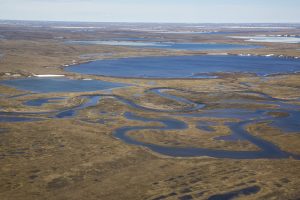Two new lawsuits seek to undo recent oil leases in Alaska’s National Petroleum Reserve
The sales took place without enough review of potential impact, environmental groups said.

Two lawsuits filed by environmentalists on Friday seek to void recent oil and gas lease sales in the National Petroleum Reserve in Alaska on the grounds that they were conducted without adequate review of development impacts. Both lawsuits were filed in U.S. District Court of Alaska, and both allege violations of key environmental and administrative laws.
Almost all of the tracts sold in the lease sales were acquired by ConocoPhillips Alaska Inc., the most active operator in the 23 million-acre reserve.
The first lawsuit, filed by Trustees for Alaska, an Anchorage-based law firm, targets the lease sale held in December. The Bureau of Land Management, the reserve’s manager, had offered a record 10.2 million acres for leasing, but ultimately, only seven tracts covering about 80,000 acres received bids, all by ConocoPhillips in partnership with Anadarko Petroleum.
The lawsuit says the Trump administration violated the National Environmental Policy Act and Administrative Procedures Act by holding the expansive lease wale without taking a “hard look”’ at direct, indirect and cumulative impacts. There was no environmental impact statement or environmental assessment conducted that considered the recent development and new information about the reserve, and the BLM neglected to do any of the required “site-specific” analysis, the lawsuit alleges.
The analysis should have considered the development already happening in NPR-A, including the Greater Mooses Tooth unit, where ConocoPhillips is gearing up for production to start later in the year.
Plaintiffs in the case are the Northern Alaska Environmental Center, Alaska Wilderness League, Defenders of Wildlife, The Wilderness Society and the Sierra Club.
The second lawsuit, filed by Earthjustice, targets both the December lease sale and the sale held a year earlier under the Obama administration. Plaintiffs are the Natural Resources Defense Council, the Center for Biological Diversity, Greenpeace and Friends of the Earth.
That lawsuit also claims violations of NEPA and the APA and calls for leases sold to be voided, but it uses some different arguments.
One provision of the lawsuit says the BLM violated federal law by neglecting to consider effects on climate change from NPR-A development.
“The production of greenhouse gas emissions from the burning of fossil fuels produced in the Reserve is a reasonably foreseeable indirect and cumulative effect of the lease sales. In fact, the very purpose of leasing in the Reserve is to produce oil and gas for consumption. Likewise, negative impacts are a foreseeable effect of producing greenhouse gas emissions,” that lawsuit says.
Additionally, the expansive 2017 lease sale raised the potential of new exploration configurations that BLM had not previously analyzed, and cumulative effects of leasing were not examined, the lawsuit says.
The 2016 auction sold leases on 27 tracts covering 155,880 acres. ConocoPhillips, in partnership with Anadarko, was the successful bidder in all but two of those tracts.
The two new lawsuits are not the first to challenge the legality of Alaska oil lease sales carried out by the Department of Interior.
Similar arguments raised in a 2008 lawsuit challenging that year’s federal lease sale in Chukchi Sea resulted in rulings that forced rewrites of the Bureau of Ocean Energy Management’s environmental impact statement, as well as a temporary suspension of all exploration activities on leased Chukchi tracts.
Yereth Rosen is a 2018 Alicia Patterson Foundation journalism fellow.